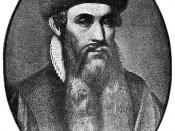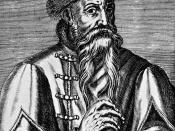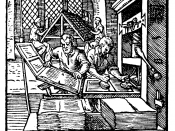Guided Reading Pages 56-60: The Renaissance in the North
Directions: Read the entire section assigned, explain the significance of the terms listed and answer the questions. You are responsible for covering this information-it is fair game for a quiz or test-ask me if you have questions!
Terms-define and explain the significance of each of the following terms.
Term | Definition and Significance (why is the term so important? Where does it fit in the context of this unit?) |
Johann Gutenberg | Johannes Gutenberg, a goldsmith and businessman from the mining town of Mainz in southern Germany, borrowed money to invent a technology that changed the world of printing. Johannes Gutenberg invented the printing press with replaceable/moveable wooden or metal letters in 1436 with which he printed "Forty-Two-Line" Bible. (completed by 1440). This method of printing can be credited not only for a revolution in the production of books, but also for fostering rapid development in the sciences, arts and religion through the transmission of texts. |
Flanders | a region that included parts of present-day northern France, Belgium, and the Netherlands; was an important industrial and financial center of northern Europe during the Middle Ages and Renaissance |
Engraving | art form in which an artist etches a design on a metal plate with acid and then uses the plate to make multiple prints |
Vernacular | The language or dialect spoken by the ordinary people in a particular country or region |
Erasmus | One of Europe's most famous and influential scholars. A man of great intellect who rose from meager beginnings to become one of Europe's greatest thinkers, he defined the humanist movement in Northern Europe. His translation to Greek of the New Testament brought on a theological revolution, and his views on the Reformation tempered its more radical elements. |
Thomas More | Known to Roman Catholics as Saint Thomas More, was an English lawyer, social philosopher, author, statesman and noted Renaissance humanist. Thomas More is known for his 1516 book Utopia. Also, More is noted for coining the word "Utopia," in reference to an ideal political system in which policies are governed by reason |
Utopian | idealistic or visionary, usually used to describe a perfect society |
Shakespeare | An English poet, playwright and actor, widely regarded as the greatest writer in the English language and the world's pre-eminent dramatist. Shakespeare updated the simplistic, two-dimensional writing style of pre-renaissance drama. He focused on creating "human" characters with psychologically complexity. |
Guiding Questions-complete the following questions using details from your reading.
How did the printing press impact Europe?
During the Middle Ages, many people didn't have enough education so they did not pay attention to books, which were costly, since every single book was written by hand. In about 1455, Johann Gutenberg printed the first complete edition of the Bible using a printing press with a movable type. Because Gutenberg's press could produce books quickly and with relatively little effort, bookmaking became much less expensive, allowing more people to buy reading material. Guttenberg's invention of the printing press in the 1440's resulted in an explosion of knowledge. This was vital to the development of the Renaissance in the North and in Italy.
What were the themes of Northern Renaissance artists?
The themes include paintings and engravings of religious scenes abound in rich, realistic details, and used oils to achieve depth and to create realistic details in vibrant colors.
How did Erasmus impact the Northern Renaissance movement?
He was one of the most important scholars of the age. He wrote texts on a number of subjects and used his knowledge of classical languages to produce a new Greek edition of the Bible.
What Renaissance ideas did Shakespeare's work address?
His work expressed universal themes in everyday, realistic settings. His work explores Renaissance ideals such as the complexity of the individual and the importance of the classics.


